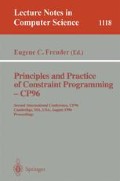Abstract
Numerous arc consistency algorithms have been developed for filtering constraint satisfaction problems (CSP). But, few of them considered the semantic of the constraints. Arc consistency algorithms work with a queue containing element to reconsider. Then, some constraints may be checked many times. Recently, Liu has proposed an improved specific version AC5+ of the AC5 algorithm. AC5+ deals with a subclass of functional constraints, called “Increasing Functional Constraints (IFC)”. It allows some IFC constraints of a CSP to be checked only once, when achieving arc consistency. In this paper, we propose a labelling arc consistency method (LAC) for filtering CSPs containing functional constraints. LAC uses two concepts:arc consistency and label-arc consistency. It allows all functional constraints to be checked only once, and some general constraints to be checked at most twice. Although, the complexity of LAC is still in O(ed) for functional constraints, where e is the number of constraints and d the size of the largest domain, the technique used in LAC leads to improve the performances and the effectiveness of classical arc consistency algorithms for CSPs containing functional constraints. The empirical results presented show the substantial gain brought by the LAC method.
Preview
Unable to display preview. Download preview PDF.
References
Bessière C., “Arc-consistency and arc-consistency again”, Research Note in Artificial Intelligence, Vol. 65, 1 pp. 179–190.
Bessière C., Freuder E.C., and Régin J-C, “Using Inference to Reduce Arc Consistency Computation”, IJCAI95, Montreal, pp592–598.
David P., “When functional and bijective constraints make a CSP polynomial”, IJCAI93, Chambery, France, pp. 224–229.
Dincbas M. and al., “Solving large combinatorial problems in logic programming”, Journal of Logic Programming, 8, pp. 75–93, 1990.
Hubbe P. and Freuder H., “An efficient Cross-Product Representation of the Constraint Satisfaction Problem Search Space”, In proc. of AAAI, 1992, P. 421–427.
Liu B., “Increasing Functional Constraints Need to Be Checked Only Once”, IJCAI95, Montreal, pp 586–591.
Mohr R. and Henderson T.C., “Arc and path consistency revisited”, Artificial Intelligence, 28–2, 1986, pp. 225–233.
Mohr R. and Masini G., “Running efficiently arc consistency”, Springer, Berlin, 1988, pp. 217–231.
Montanari U., “Networks of constraints: Fundamental properties and applications to picture processing”, Inform. Sci., vol. 7 n∘2, 1974, p. 95–132.
Van Hentenryck P., “Constraint satisfaction in Logic Programming”, MIT press, Cambridge, MA, 1989.
Van Hentenryck P., Devilles Y. and Teng C-M., A generic arc consistency algorithm and its specifications. Artificial Intelligence, 27, pp. 291–322, 1992.
Author information
Authors and Affiliations
Editor information
Rights and permissions
Copyright information
© 1996 Springer-Verlag Berlin Heidelberg
About this paper
Cite this paper
Affane, M.S., Bennaceur, H. (1996). A labelling arc consistency method for functional constraints. In: Freuder, E.C. (eds) Principles and Practice of Constraint Programming — CP96. CP 1996. Lecture Notes in Computer Science, vol 1118. Springer, Berlin, Heidelberg. https://doi.org/10.1007/3-540-61551-2_63
Download citation
DOI: https://doi.org/10.1007/3-540-61551-2_63
Published:
Publisher Name: Springer, Berlin, Heidelberg
Print ISBN: 978-3-540-61551-4
Online ISBN: 978-3-540-70620-5
eBook Packages: Springer Book Archive

